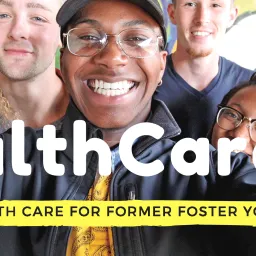
Signed into law in 2010, the Affordable Care Act (ACA) was a landmark piece of legislation in many ways. It helped millions of previously uninsured Americans gain access to insurance, and several of its provisions (such as the individual mandate) sparked intense legal battles.
Amidst this controversy, one provision of the ACA has received notably less attention: the Former Foster Youth Provision, which extends Medicaid coverage to former foster youth (FFY) until age 26. While an individual is in foster care, they are automatically eligible for Medicaid. However, prior to the ACA, young adults lost their Medicaid eligibility once they aged out of the foster care system. This provision allows FFY to access necessary health care services, to build a strong and healthy foundation for their adult lives, and to have parity with their peers (who can remain on their parents' insurance plans until age 26).
On the surface, the ACA was a game-changer for FFY across the nation. These youth tend to be insured at much lower rates than their peers while at the same time grappling with higher rates of a wide variety of physical and mental health conditions (including asthma, visual and auditory problems, dental decay, anxiety, and PTSD).
However, there was a key problem--a "glitch." Because of a simple issue with the provision's wording, states were not able to cover former foster youth who were in care in another state (called "relocators") without filing for a special Medicaid 1115 waiver. Only a handful of states chose to do so. This left countless FFY without access to vital health care coverage when they moved states to attend college, pursue job opportunities, or be closer to their support systems.
After years of tireless work from former foster youth and advocates alike, the "glitch" was fixed. In October of 2018, Congress passed the SUPPORT Act. This bill contained a provision requiring that states extend Medicaid coverage to all former foster youth, including those who were in care in another state. This legislation is a huge victory and a vital step toward ensuring that all FFY have access to the health care promised to them by the ACA.
The SUPPORT Act is a great first step. However, it is just that: a step. The provision does not go into effect until 2023. Legislation has recently been introduced by Senator Bob Casey and Representative Karen Bass to speed up this timeline, making the provision of the SUPPORT Act extending coverage to relocators go into effect immediately (see S. 1697 and H.R. 3057). However, it remains to be seen if these bills will become law. This leaves many FFY without access to care in the meantime. 20,000 youth age out of the foster care system each year. Health issues and crises do not wait. They do not abide by government timelines. FFY cannot wait four years. They need--and deserve--health care now.
Luckily, states need not wait until 2023. There are things that they can do in the meantime to ensure that as many FFY as possible are able to access the health care benefits promised to them by the ACA. States can extend Medicaid coverage to relocators now by apply 1115 waivers. They can also take other steps to minimize barriers to FFY applying for coverage. For example, states can simplify Medicaid applications, make annual renewal processes automatic, designate dedicated contact people to help FFY navigate the application and renewal processes, and increase outreach efforts to ensure that all FFY are aware of the health care benefits to which they are entitled.
The SUPPORT Act is a great victory in the fight for equitable health care access for former foster youth--on the youth, advocates, and lawmakers alike should be proud of. However, this federal legislation is not enough. Health is an immediate issue that deserves immediate action. States can, and should, take steps to ensure that as many FFY as possible have access to the care that they so desperately need.
